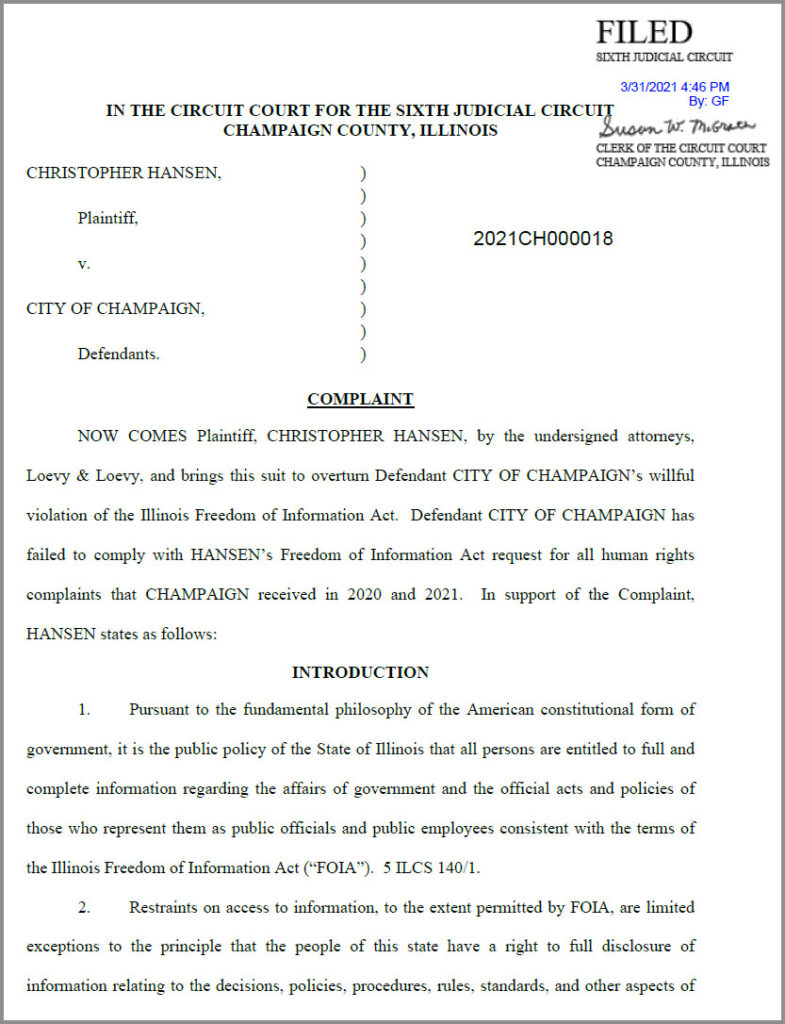The February 1st 2021 meeting of the Champaign Human Relations Commission (HRC) revealed a most bizarre and nonsensical City of Champaign policy: according to City staff, the HRC and the public are not allowed to see or know any details about Human Rights complaints submitted to the City.
The issue was raised when HRC member Robin McClain asked Community Relations Manager Rachel Joy if the Commission could see details on recent housing and discrimination complaints. Joy said “those complaints are all confidential unless they would come to a public hearing – that’s when the Commission would see those…the only case that you would see, would be that at a public hearing.” Then McClain asked if there were any complaints at all over the past year that the Commission members could see, and Joy said, “No, you would only see it if it was a public hearing.”
The exchange at the February 1st HRC meeting between McClain and Joy can be viewed here:
Blocking access to City complaint procedures is not a new tactic for Rachel Joy. In 2018, it was discovered that Joy along with Assistant City Attorney Laura Hall was actively trying to snub residents’ access to Champaign’s police complaint process. To date, the City has refused to issue comment on that incident and similar incidents continue to plague the Citizen Review Subcommittee assigned to reviewing police complaints.
Oddly, the members of the HRC did not appear bothered that they were being kept entirely in the dark in regards to human rights complaints. Due to the secretive nature of the complaint process, it is not known to anyone (other than City staff) if the complaints are against private companies or against the City of Champaign, or both. Without knowing any details, it would seem impossible for the HRC to meaningfully pursue its goal of promoting “equal rights and opportunities in the City”.
After hearing the exchange at the February 1st HRC meeting, Check CU author Christopher Hansen spoke during public input and expressed surprise and confusion as to why the HRC would not be allowed to know any details about complaints directed at their board. Receiving discrimination complaints is central to the very creation and purpose of the Commission.
The City Ordinance which provides the legal creation and duties of the HRC, and Section 2-528 titled “Purpose and duties” clearly indicates that the HRC shall receive discrimination complaints:
“The purposes of the Human Relations Commission shall be to:
…
(8) Receive and investigate complaints involving discrimination based on race, religion, national origin, sex, age or handicap.”
After hearing public input on the issue, HRC member Demario Turner remarked that it was important to bring such issues back to City staff and return an answer to the public. However, the issue of the HRC not being allowed to see discrimination complaints was not discussed at the March HRC meeting.
In addition to the City Ordinance making clear that the HRC should have access to discrimination complaints, the Illinois Freedom of Information Act (FOIA) allows any person to request copies of those complaints from the City. It would seem nonsensical for the City to refuse to provide complaint details to the members of the HRC when those same individuals could acquire the information through a FOIA request.
Check CU made such a FOIA request on February 7th, but Assistant City Attorney Jennifer Bannon denied the request in its entirety, refusing to provide a single page. Bannon did not cite any lawful state FOIA exemption but pointed back at the City’s own ordinance (Bannon’s FOIA denial letter can be seen within the lawsuit complaint PDF below). According to Loevy & Loevy, a civil rights law firm based in Chicago, the City of Champaign has no legal basis to deny the records.
Since the City of Champaign refuses to provide copies of discrimination complaints to the HRC, and has unlawfully denied a FOIA request for the complaints, Check CU has filed a lawsuit in the Sixth Judicial Circuit Court to compel Champaign to release the records. The lawsuit was filed March 31st, and seeks copies of human rights complaints from 2019 and 2020, but not the names or private information of the complainants.
The court filing can be seen here (click for full 8-page PDF):


Three of four city officials copied atop the FOIA denial letter are, according to the ARDC, registered attorneys.
KEC – May 5, 2016
TSU – Nov 9, 2000
FCS – Oct 29, 1976
More than 50 years combined experience. Nevertheless, another FOIA denial and another “you may” FOIA lawsuit …as if granting you permission?
Good luck.